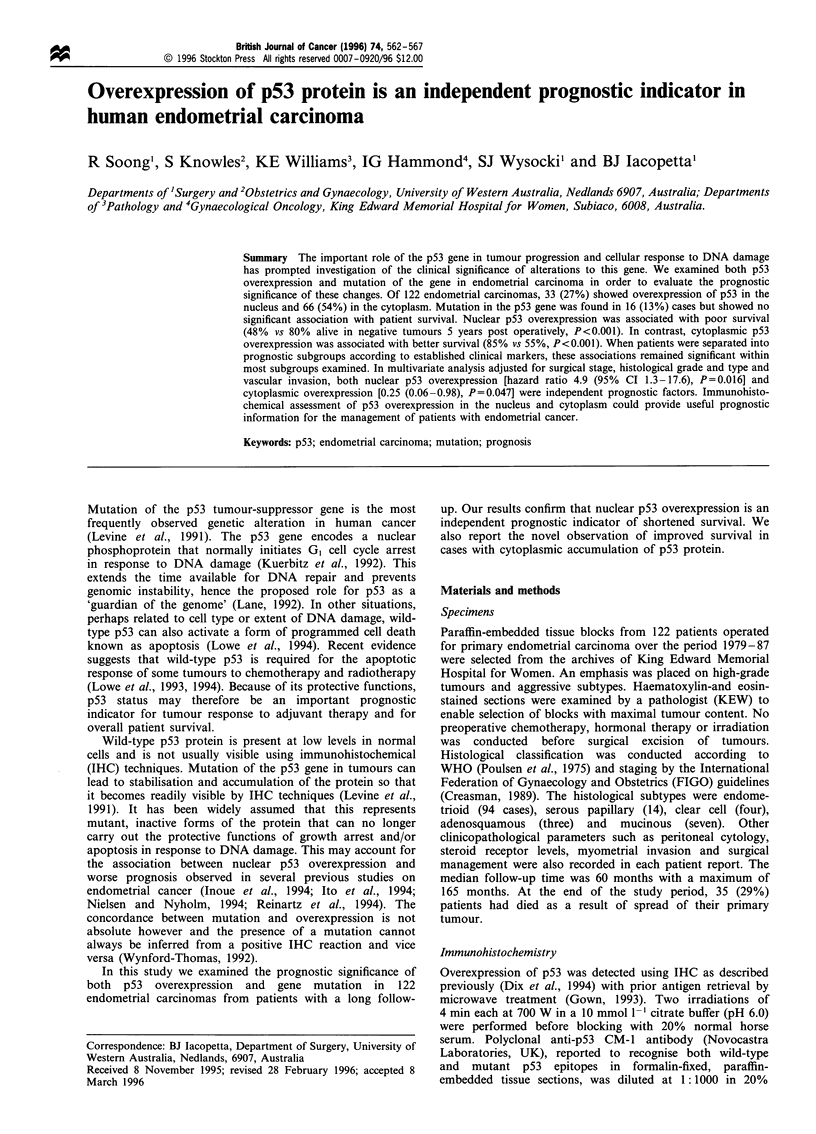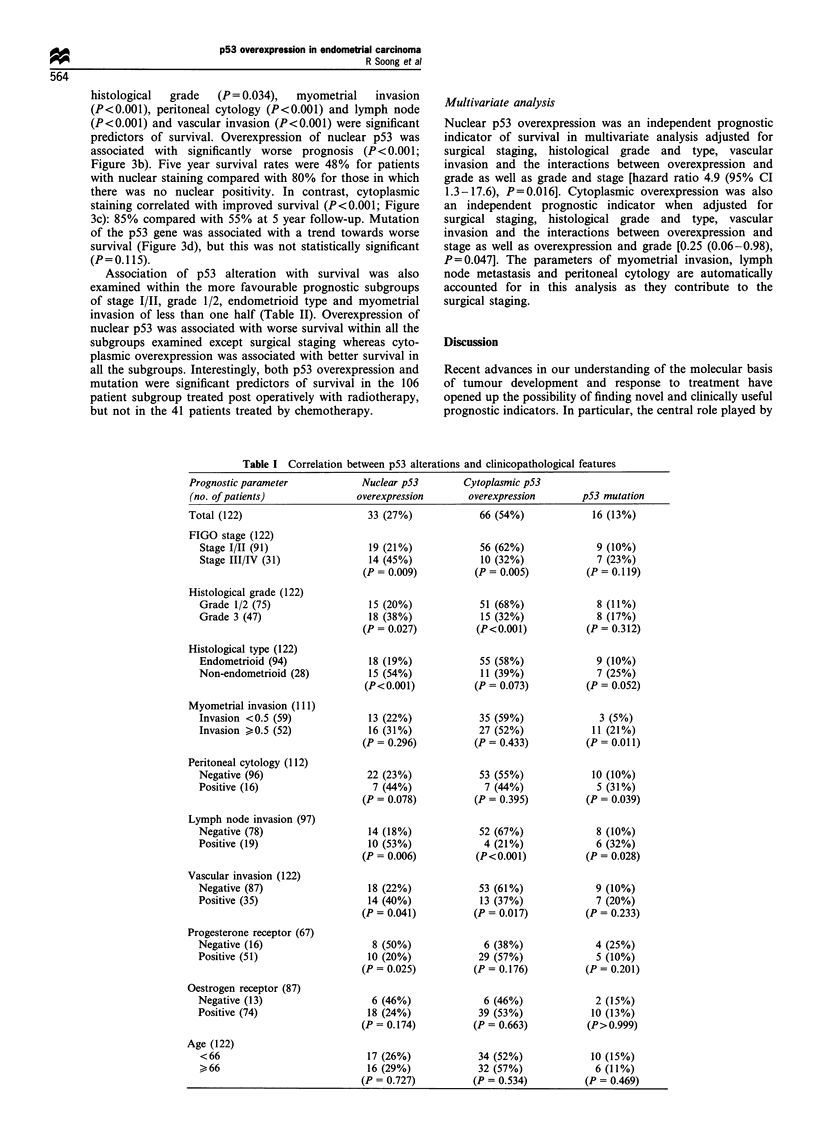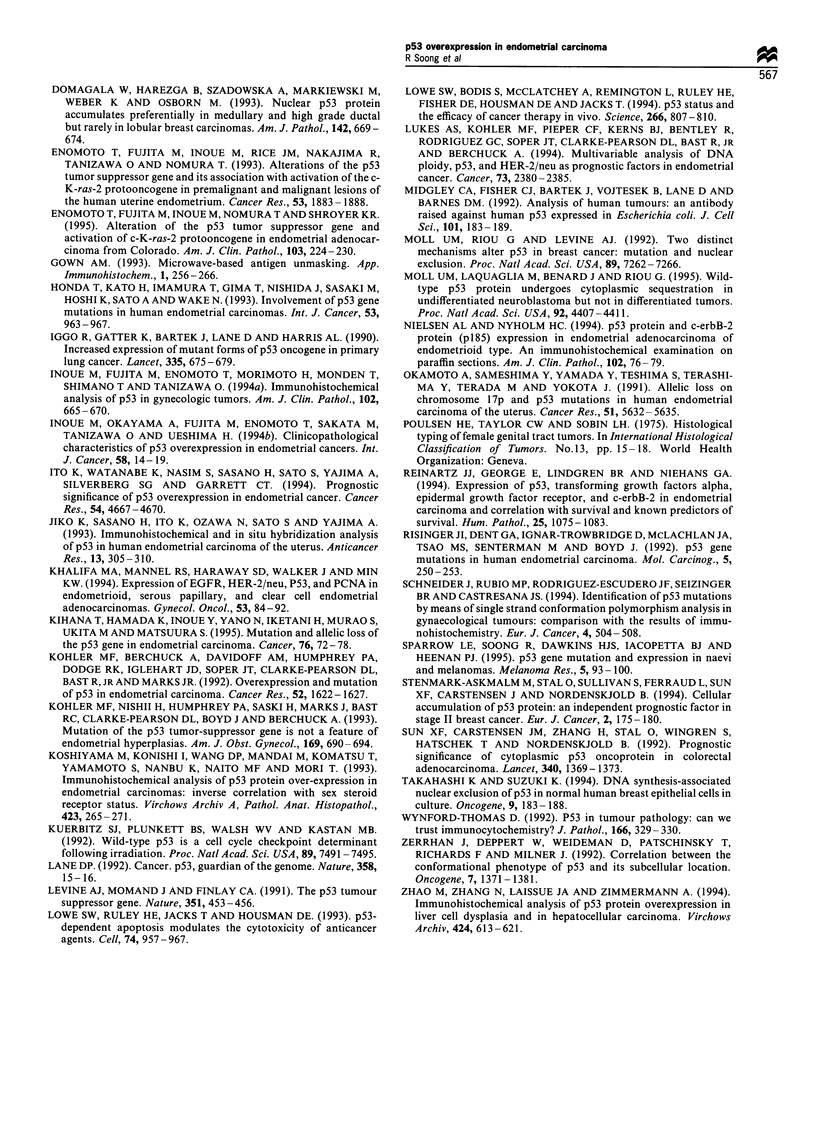Abstract
The important role of the p53 gene in tumour progression and cellular response to DNA damage has prompted investigation of the clinical significance of alterations to this gene. We examined both p53 overexpression and mutation of the gene in endometrial carcinoma in order to evaluate the prognostic significance of these changes. Of 122 endometrial carcinomas, 33 (27%) showed overexpression of p53 in the nucleus and 66 (54%) in the cytoplasm. Mutation in the p53 gene was found in 16 (13%) cases but showed no significant association with patient survival. Nuclear p53 overexpression was associated with poor survival (48% vs 80% alive in negative tumours 5 years post operatively, P < 0.001). In contrast, cytoplasmic p53 overexpression was associated with better survival (85% vs 55%, P < 0.001). When patients were separated into prognostic subgroups according to established clinical markers, these associations remained significant within most subgroups examined. In multivariate analysis adjusted for surgical stage, histological grade and type and vascular invasion, both nuclear p53 overexpression [hazard ratio 4.9 (95% CI 1.3-17.6). P = 0.016] and cytoplasmic overexpression [0.25 (0.06-0.98), P = 0.047] were independent prognostic factors. Immunohistochemical assessment of p53 overexpression in the nucleus and cytoplasm could provide useful prognostic information for the management of patients with endometrial cancer.
Full text
PDF





Images in this article
Selected References
These references are in PubMed. This may not be the complete list of references from this article.
- Ambros R. A., Vigna P. A., Figge J., Kallakury B. V., Mastrangelo A., Eastman A. Y., Malfetano J., Figge H. L., Ross J. S. Observations on tumor and metastatic suppressor gene status in endometrial carcinoma with particular emphasis on p53. Cancer. 1994 Mar 15;73(6):1686–1692. doi: 10.1002/1097-0142(19940315)73:6<1686::aid-cncr2820730622>3.0.co;2-w. [DOI] [PubMed] [Google Scholar]
- Bosari S., Viale G., Bossi P., Maggioni M., Coggi G., Murray J. J., Lee A. K. Cytoplasmic accumulation of p53 protein: an independent prognostic indicator in colorectal adenocarcinomas. J Natl Cancer Inst. 1994 May 4;86(9):681–687. doi: 10.1093/jnci/86.9.681. [DOI] [PubMed] [Google Scholar]
- Bosari S., Viale G., Roncalli M., Graziani D., Borsani G., Lee A. K., Coggi G. p53 gene mutations, p53 protein accumulation and compartmentalization in colorectal adenocarcinoma. Am J Pathol. 1995 Sep;147(3):790–798. [PMC free article] [PubMed] [Google Scholar]
- Bur M. E., Perlman C., Edelmann L., Fey E., Rose P. G. p53 expression in neoplasms of the uterine corpus. Am J Clin Pathol. 1992 Jul;98(1):81–87. doi: 10.1093/ajcp/98.1.81. [DOI] [PubMed] [Google Scholar]
- Dix B., Robbins P., Carrello S., House A., Iacopetta B. Comparison of p53 gene mutation and protein overexpression in colorectal carcinomas. Br J Cancer. 1994 Oct;70(4):585–590. doi: 10.1038/bjc.1994.355. [DOI] [PMC free article] [PubMed] [Google Scholar]
- Domagala W., Harezga B., Szadowska A., Markiewski M., Weber K., Osborn M. Nuclear p53 protein accumulates preferentially in medullary and high-grade ductal but rarely in lobular breast carcinomas. Am J Pathol. 1993 Mar;142(3):669–674. [PMC free article] [PubMed] [Google Scholar]
- Enomoto T., Fujita M., Inoue M., Nomura T., Shroyer K. R. Alteration of the p53 tumor suppressor gene and activation of c-K-ras-2 protooncogene in endometrial adenocarcinoma from Colorado. Am J Clin Pathol. 1995 Feb;103(2):224–230. doi: 10.1093/ajcp/103.2.224. [DOI] [PubMed] [Google Scholar]
- Enomoto T., Fujita M., Inoue M., Rice J. M., Nakajima R., Tanizawa O., Nomura T. Alterations of the p53 tumor suppressor gene and its association with activation of the c-K-ras-2 protooncogene in premalignant and malignant lesions of the human uterine endometrium. Cancer Res. 1993 Apr 15;53(8):1883–1888. [PubMed] [Google Scholar]
- Honda T., Kato H., Imamura T., Gima T., Nishida J., Sasaki M., Hoshi K., Sato A., Wake N. Involvement of p53 gene mutations in human endometrial carcinomas. Int J Cancer. 1993 Apr 1;53(6):963–967. doi: 10.1002/ijc.2910530617. [DOI] [PubMed] [Google Scholar]
- Iggo R., Gatter K., Bartek J., Lane D., Harris A. L. Increased expression of mutant forms of p53 oncogene in primary lung cancer. Lancet. 1990 Mar 24;335(8691):675–679. doi: 10.1016/0140-6736(90)90801-b. [DOI] [PubMed] [Google Scholar]
- Inoue M., Fujita M., Enomoto T., Morimoto H., Monden T., Shimano T., Tanizawa O. Immunohistochemical analysis of p53 in gynecologic tumors. Am J Clin Pathol. 1994 Nov;102(5):665–670. doi: 10.1093/ajcp/102.5.665. [DOI] [PubMed] [Google Scholar]
- Inoue M., Okayama A., Fujita M., Enomoto T., Sakata M., Tanizawa O., Ueshima H. Clinicopathological characteristics of p53 overexpression in endometrial cancers. Int J Cancer. 1994 Jul 1;58(1):14–19. doi: 10.1002/ijc.2910580104. [DOI] [PubMed] [Google Scholar]
- Ito K., Watanabe K., Nasim S., Sasano H., Sato S., Yajima A., Silverberg S. G., Garrett C. T. Prognostic significance of p53 overexpression in endometrial cancer. Cancer Res. 1994 Sep 1;54(17):4667–4670. [PubMed] [Google Scholar]
- Jiko K., Sasano H., Ito K., Ozawa N., Sato S., Yajima A. Immunohistochemical and in situ hybridization analysis of p53 in human endometrial carcinoma of the uterus. Anticancer Res. 1993 Mar-Apr;13(2):305–310. [PubMed] [Google Scholar]
- Khalifa M. A., Mannel R. S., Haraway S. D., Walker J., Min K. W. Expression of EGFR, HER-2/neu, P53, and PCNA in endometrioid, serous papillary, and clear cell endometrial adenocarcinomas. Gynecol Oncol. 1994 Apr;53(1):84–92. doi: 10.1006/gyno.1994.1092. [DOI] [PubMed] [Google Scholar]
- Kihana T., Hamada K., Inoue Y., Yano N., Iketani H., Murao S., Ukita M., Matsuura S. Mutation and allelic loss of the p53 gene in endometrial carcinoma. Incidence and outcome in 92 surgical patients. Cancer. 1995 Jul 1;76(1):72–78. doi: 10.1002/1097-0142(19950701)76:1<72::aid-cncr2820760110>3.0.co;2-3. [DOI] [PubMed] [Google Scholar]
- Kohler M. F., Berchuck A., Davidoff A. M., Humphrey P. A., Dodge R. K., Iglehart J. D., Soper J. T., Clarke-Pearson D. L., Bast R. C., Jr, Marks J. R. Overexpression and mutation of p53 in endometrial carcinoma. Cancer Res. 1992 Mar 15;52(6):1622–1627. [PubMed] [Google Scholar]
- Kohler M. F., Nishii H., Humphrey P. A., Saski H., Marks J., Bast R. C., Clarke-Pearson D. L., Boyd J., Berchuck A. Mutation of the p53 tumor-suppressor gene is not a feature of endometrial hyperplasias. Am J Obstet Gynecol. 1993 Sep;169(3):690–694. doi: 10.1016/0002-9378(93)90644-x. [DOI] [PubMed] [Google Scholar]
- Koshiyama M., Konishi I., Wang D. P., Mandai M., Komatsu T., Yamamoto S., Nanbu K., Naito M. F., Mori T. Immunohistochemical analysis of p53 protein over-expression in endometrial carcinomas: inverse correlation with sex steroid receptor status. Virchows Arch A Pathol Anat Histopathol. 1993;423(4):265–271. doi: 10.1007/BF01606889. [DOI] [PubMed] [Google Scholar]
- Kuerbitz S. J., Plunkett B. S., Walsh W. V., Kastan M. B. Wild-type p53 is a cell cycle checkpoint determinant following irradiation. Proc Natl Acad Sci U S A. 1992 Aug 15;89(16):7491–7495. doi: 10.1073/pnas.89.16.7491. [DOI] [PMC free article] [PubMed] [Google Scholar]
- Lane D. P. Cancer. p53, guardian of the genome. Nature. 1992 Jul 2;358(6381):15–16. doi: 10.1038/358015a0. [DOI] [PubMed] [Google Scholar]
- Levine A. J., Momand J., Finlay C. A. The p53 tumour suppressor gene. Nature. 1991 Jun 6;351(6326):453–456. doi: 10.1038/351453a0. [DOI] [PubMed] [Google Scholar]
- Lowe S. W., Bodis S., McClatchey A., Remington L., Ruley H. E., Fisher D. E., Housman D. E., Jacks T. p53 status and the efficacy of cancer therapy in vivo. Science. 1994 Nov 4;266(5186):807–810. doi: 10.1126/science.7973635. [DOI] [PubMed] [Google Scholar]
- Lowe S. W., Ruley H. E., Jacks T., Housman D. E. p53-dependent apoptosis modulates the cytotoxicity of anticancer agents. Cell. 1993 Sep 24;74(6):957–967. doi: 10.1016/0092-8674(93)90719-7. [DOI] [PubMed] [Google Scholar]
- Lukes A. S., Kohler M. F., Pieper C. F., Kerns B. J., Bentley R., Rodriguez G. C., Soper J. T., Clarke-Pearson D. L., Bast R. C., Jr, Berchuck A. Multivariable analysis of DNA ploidy, p53, and HER-2/neu as prognostic factors in endometrial cancer. Cancer. 1994 May 1;73(9):2380–2385. doi: 10.1002/1097-0142(19940501)73:9<2380::aid-cncr2820730922>3.0.co;2-g. [DOI] [PubMed] [Google Scholar]
- Midgley C. A., Fisher C. J., Bártek J., Vojtesek B., Lane D., Barnes D. M. Analysis of p53 expression in human tumours: an antibody raised against human p53 expressed in Escherichia coli. J Cell Sci. 1992 Jan;101(Pt 1):183–189. doi: 10.1242/jcs.101.1.183. [DOI] [PubMed] [Google Scholar]
- Moll U. M., LaQuaglia M., Bénard J., Riou G. Wild-type p53 protein undergoes cytoplasmic sequestration in undifferentiated neuroblastomas but not in differentiated tumors. Proc Natl Acad Sci U S A. 1995 May 9;92(10):4407–4411. doi: 10.1073/pnas.92.10.4407. [DOI] [PMC free article] [PubMed] [Google Scholar]
- Moll U. M., Riou G., Levine A. J. Two distinct mechanisms alter p53 in breast cancer: mutation and nuclear exclusion. Proc Natl Acad Sci U S A. 1992 Aug 1;89(15):7262–7266. doi: 10.1073/pnas.89.15.7262. [DOI] [PMC free article] [PubMed] [Google Scholar]
- Nielsen A. L., Nyholm H. C. p53 protein and c-erbB-2 protein (p185) expression in endometrial adenocarcinoma of endometrioid type. An immunohistochemical examination on paraffin sections. Am J Clin Pathol. 1994 Jul;102(1):76–79. doi: 10.1093/ajcp/102.1.76. [DOI] [PubMed] [Google Scholar]
- Okamoto A., Sameshima Y., Yamada Y., Teshima S., Terashima Y., Terada M., Yokota J. Allelic loss on chromosome 17p and p53 mutations in human endometrial carcinoma of the uterus. Cancer Res. 1991 Oct 15;51(20):5632–5635. [PubMed] [Google Scholar]
- Reinartz J. J., George E., Lindgren B. R., Niehans G. A. Expression of p53, transforming growth factor alpha, epidermal growth factor receptor, and c-erbB-2 in endometrial carcinoma and correlation with survival and known predictors of survival. Hum Pathol. 1994 Oct;25(10):1075–1083. doi: 10.1016/0046-8177(94)90068-x. [DOI] [PubMed] [Google Scholar]
- Risinger J. I., Dent G. A., Ignar-Trowbridge D., McLachlan J. A., Tsao M. S., Senterman M., Boyd J. p53 gene mutations in human endometrial carcinoma. Mol Carcinog. 1992;5(4):250–253. doi: 10.1002/mc.2940050403. [DOI] [PubMed] [Google Scholar]
- Schneider J., Rubio M. P., Rodriguez-Escudero F. J., Seizinger B. R., Castresana J. S. Identification of p53 mutations by means of single strand conformation polymorphism analysis in gynaecological tumours: comparison with the results of immunohistochemistry. Eur J Cancer. 1994;30A(4):504–508. doi: 10.1016/0959-8049(94)90427-8. [DOI] [PubMed] [Google Scholar]
- Sparrow L. E., Soong R., Dawkins H. J., Iacopetta B. J., Heenan P. J. p53 gene mutation and expression in naevi and melanomas. Melanoma Res. 1995 Apr;5(2):93–100. doi: 10.1097/00008390-199504000-00004. [DOI] [PubMed] [Google Scholar]
- Stenmark-Askmalm M., Stål O., Sullivan S., Ferraud L., Sun X. F., Carstensen J., Nordenskjöld B. Cellular accumulation of p53 protein: an independent prognostic factor in stage II breast cancer. Eur J Cancer. 1994;30A(2):175–180. doi: 10.1016/0959-8049(94)90082-5. [DOI] [PubMed] [Google Scholar]
- Sun X. F., Carstensen J. M., Zhang H., Stål O., Wingren S., Hatschek T., Nordenskjöld B. Prognostic significance of cytoplasmic p53 oncoprotein in colorectal adenocarcinoma. Lancet. 1992 Dec 5;340(8832):1369–1373. doi: 10.1016/0140-6736(92)92558-w. [DOI] [PubMed] [Google Scholar]
- Takahashi K., Suzuki K. DNA synthesis-associated nuclear exclusion of p53 in normal human breast epithelial cells in culture. Oncogene. 1994 Jan;9(1):183–188. [PubMed] [Google Scholar]
- Wynford-Thomas D. P53 in tumour pathology: can we trust immunocytochemistry? J Pathol. 1992 Apr;166(4):329–330. doi: 10.1002/path.1711660402. [DOI] [PubMed] [Google Scholar]
- Zerrahn J., Deppert W., Weidemann D., Patschinsky T., Richards F., Milner J. Correlation between the conformational phenotype of p53 and its subcellular location. Oncogene. 1992 Jul;7(7):1371–1381. [PubMed] [Google Scholar]
- Zhao M., Zhang N. X., Laissue J. A., Zimmermann A. Immunohistochemical analysis of p53 protein overexpression in liver cell dysplasia and in hepatocellular carcinoma. Virchows Arch. 1994;424(6):613–621. doi: 10.1007/BF00195775. [DOI] [PubMed] [Google Scholar]




